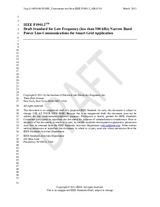Wir benötigen Ihre Einwilligung zur Verwendung der einzelnen Daten, damit Sie unter anderem Informationen zu Ihren Interessen einsehen können. Klicken Sie auf "OK", um Ihre Zustimmung zu erteilen.

IEEE 1901.2
IEEE Standard for Low Frequency (less than 500 kHz) Narrow BandPower Line Communications for Smart Grid Application - Coexistence text from IEEE P1901.2_vD0.07.01
Automatische name übersetzung:
IEEE-Standard für Low Frequency (weniger als 500 kHz) Schmalbandpower Linie Kommunikation für Smart-Grid-Anwendungen - Koexistenz Text aus IEEE P1901.2_vD0.07.01
NORM herausgegeben am 6.12.2013
| Zugänglichkeit | AUF LAGER |
| Preis | AUF ANFRAGE ohne MWS |
| AUF ANFRAGE |
Informationen über die Norm:
Bezeichnung normen: IEEE 1901.2
Ausgabedatum normen: 6.12.2013
SKU: NS-416174
Gewicht ca.: 300 g (0.66 Pfund)
Land: Internationale technische Norm
Kategorie: Technische Normen IEEE
Die Annotation des Normtextes IEEE 1901.2 :
- Active.
This contribution represents the coexistence-related text from IEEE P1901.2 working draft version D0.07.01. It includes clause 10 and convenient front matter. Developed by IEEE P1901.2, this is a worldwide standard for coexistence mechnisms that can be used for narrowband power line communications via ac, dc, and non-energized electric power lines using frequencies below 500 kHz. The field-of-use includes Smart Grid applications. Coexistence mechanisms that can be used by other PLC technologies operating below 500 kHz are also included. These coexistence mechanisms may be used separately from the rest of the IEEE P1901.2TM.
ISBN: 978-0-7381-8329-9
Number of Pages: 29
Product Code: STDUD98186
Keywords: coesistence, IEEE 1901.2 TM, power line communication, PLC, medium access control, MAC, physical layer, PHY, IFFT OFDM, narrow band, PRIME, G3
Category: Local and Metropolitan Area Networks (LAN/MAN)|General/Other - Communication and Information|Smart Grid|Power Systems Communication


 Cookies
Cookies
